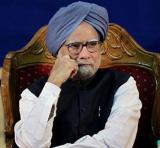
New Delhi, April 16: A stiff opposition from non-Congress Chief Ministers and a Congress ally over NCTC and other issues of Centre allegedly encroaching upon the states' policing powers today cast its shadow at the conference on internal security here.
Notwithstanding efforts by Singh and Home Minister P Chidambaram in trying to reach out to the states that they were together in tackling terrorism, chief ministers including Narendra Modi, J Jayalalithaa and Naveen Patnaik attacked the Centre.
Modi and Patnaik even met Jayalalithaa separately later and are understood to have discussed a common strategy on issues like NCTC.
Prime Minister Manmohan Singh tried to reach out to the chief ministers during the conference by favouring joint and coordinated efforts to deal with challenges of terrorism.
"There is no question that the burden of the fight against terrorism falls largely on the states' machinery. The Centre is ready to work with the states to put in place strong and effective institutional mechanisms to tackle this problem," he said.
Home Minister P Chidambaram also tried assure the chief ministers that there was no conflict between the Central and State agencies and they work together on the ground to deal with terrorists.
"..I would once again like to underscore my firm belief that, bound by the Constitution of India and working together, we can make this country safe and secure; ensure peace and harmony; and create an environment that will promote faster and more inclusive growth," he said.
The Centre's move for setting up a National Counter Terrorism Centre (NCTC) was one of the issues which was on top of the mind of the non-Congress chief ministers despite the fact that a separate conference of the chief ministers has been called on May 5 for discussing that issue.
The chief ministers said the Centre was not consulting states on key security issues in which the state's powers are "abrogated" with West Bengal Chief Minister Mamata Banerjee opposing the? NCTC as it "upsets" the federal structure.
Meanwhile, Congress-ruled Rajasthan Chief Minister Ashok Gehlot asked the opposing Chief Ministers to not use the forum for political agenda and control their language.
"The participants should use controlled language at such forums of national importance and these forums should not be used as a platform for political speech. This is not correct.
The language used by the CMs of Gujarat and Tamil Nadu was not correct," Gehlot said in his statement.
In her speech, Jayalalithaa hit out at the Centre for "encroaching on state powers" through the NCTC which was in "contravention" to constitutional provisions that accord priority status to police in the State list.
"Lack of consultation with the states and failure to take the states into confidence is a cogent commentary on the system of governance in the Centre," she said.
Modi said Centre was adopting a "non-consultative" approach with state governments on key security issues.
He said Centre was creating a "state within a state" by considering changes to RPF Act and BSF Act which take away powers from the state police and meddling with subjects under the state list.
Modi said the Centre was creating an atmosphere of distrust between the Centre and the States on matters of internal security which was not good. He asked the Prime Minister to take steps to remove the distrust.
On the matter of NCTC, Banerjee said that "it upsets the federal structure of the country".






Comments
Add new comment